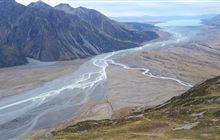Project River Recovery
Introduction
Project River Recovery maintains and restores braided river and wetland habitat in the South Island’s upper Waitaki Basin for the benefit of its native plants and animals, some of which are only found in, or only breed in, this region.
Project River Recovery was established in 1990, recognising the impacts of hydroelectric development on braided rivers and wetlands. The project is funded through a compensatory funding agreement with Meridian Energy Limited and Genesis Energy.
Project River Recovery's work includes intensive weed control, predator control, construction of wetlands, and research and monitoring programmes.
This work is complemented by a public awareness campaign, aimed at increasing knowledge and respect for braided rivers and their unique wildlife. This includes giving talks to school and university groups and working closely with Meridian Energy, Genesis Energy, Ngaï Tahu, regional and district councils, riverbank neighbours and others.
Research and monitoring
Project River Recovery does research and monitoring to build knowledge of the natural heritage values in braided river systems. Some of these projects are:
- Video predator study: A five-year video camera study to determine the causes of nest failure for three braided river bird species – banded dotterel/turiwhatu, black stilt/kakī and black-fronted tern/tarapirohe. This study confirmed that introduced predators – particularly feral cats, ferrets and hedgehogs – are the main cause of nest failures for these braided river birds.
- Plant survey: Aims to describe the plant communites, establish the environmental factors influencing their distribution and structure, Identify nationally threatened plant species and communities of regional or national significance and Identify threats.
- Invertebrate survey: A pilot survey of terrestrial invertebrates in the Tasman River aims to develop efficient sampling methods for invertebrate communities in riverbeds. A cost-effective method will allow us to assess terrestrial invertebrate communitiies in other braided river systems in the upper Waitaki Basin.
- Native fish monitoring of long-term population change of the threatened upland longjaw galaxias at three sites in the Tasman and Hopkins rivers.
- Weed control: aims to improve how weeds are managed in braided rivers.
- Monitoring of the breeding success of wrybill/ngutu pare, banded dotterel/pohowera and black-fronted tern/tarapirohe to assess if predator control is helping these birds.
Publications
Strategic plan
- Project River Recovery Interim Strategic Plan 2020-2023 (PDF, 586K)
- Project River Recovery Strategic Plan 2012-2019 (PDF, 2,192K)
Studies
- The vegetation of braided rivers in the upper Waitaki basin (PDF, 3,374K)
- Tasman river invertebrate study (PDF, 2,688K)
Annual report
- Project River Recovery Annual Report 2020-21 (PDF, 4,500K)
- Project River Recovery Annual Report 2013-14 (PDF, 885K)
- Project River Recovery Annual Report 2012-13 (PDF, 410K)
- Project River Recovery Annual Report 2011-12 (PDF, 282 K)
- Project River Recovery Annual Report 2010-11 (PDF, 272 K)
- Project River Recovery Annual Report 2009-10 (PDF, 95K)
- Project River Recovery Annual Report 2008-09 (PDF, 88K)
Resources
- Braided River Care Code brochure (PDF, 418K)
- Braided River Field Guide (PDF, 1,720K)
- Braided rivers poster (PDF 1,650K)
Contact
| DOC Customer Service Centre | |
|---|---|
| Phone | 0800 275 362 |
| info@doc.govt.nz | |
| Address | DOC offices |

